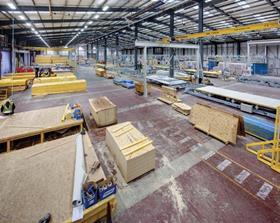House of Lords Science & Technology committee report calls for ‘strong leadership’ from the Construction Leadership Council

Out-dated and unsustainable business models are hampering the take-up of off-site manufacturing in the construction industry, thwarting the government’s ambition to build 300,000 homes a year by 2020, according to a new report from the House of Lords.
Peers on the House of Lords’ Science & Technology Committee highlighted in the report – ‘Offsite Manufacture For Construction: Building For Change’ – what they called “the benefits [it offered] in creating better-quality buildings and infrastructure, produced to more consistent and testable standards”.
The committee said off-site manufacturing (OSM) would be the only way for the government to fulfil its promise of meeting the 300,000 homes a year target by 2020, since traditional construction methods did not have the capacity to meet the demand.
Peers said they had heard evidence that OSM could increase productivity in the sector by up to 70%, boosting not only housebuilding but infrastructure activity.
But they also found that the industry’s take-up of OSM varied across the sector.
“Much of the evidence we received painted a picture of a construction sector which is fragmented and lacking in trust.
“The current business models and the traditional model of financing and cash flow in the construction sector make it difficult to deliver the benefits of off-site manufacture for construction.”
Peers said the industry had to crack the problem and called for “strong leadership” from the Construction Leadership Council.
The report added that the government “must set out what conditions it will attach to the extra financial support for housing to drive the uptake of off-site manufacture and other innovative technologies”, while firms needed more certainty around outcomes for their long term investment.
Key performance indicators should be used to measure the success of the government’s ‘presumption in favour’ of OSM being used on a project – and if it wasn’t going to be employed ministers should have to explain why.
Peers also wanted to see greater cooperation between government and industry on a range of new technical qualifications which would help close the skills gap.
Committee chairman Lord Patel said: “The construction sector’s business models are no longer appropriate and are not supporting the UK’s urgent need for new homes and infrastructure.
“The sector needs to build more trust and create partnerships so that companies can work together to improve the uptake of off-site manufacture, and the Construction Leadership Council should provide the necessary leadership.”
Welcoming the report at its launch, industry expert Mark Farmer said there were signs of long-term positive change. “The stars are aligning in ways they haven’t before. We’re some way from the tipping point, but we are getting there.”
Farmer, whose own 2016 report ‘Modernise Or Die’ highlighted areas where the industry needed to improve, said there had to be “a ruthless focus on future skills” if the sector was going to embrace off-site production effectively.
He also said the government needed to be held to account over its ‘presumption to favour’ off-site manufacturing on public sector projects.
Last week Legal & General said it was preparing to start installing onsite modular homes made in its Yorkshire factory, two years behind schedule.
The insurance giant said issues with the manufacturing process, now sorted, had been responsible for the hold up.


























No comments yet